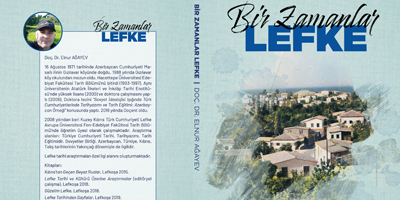Ağayev’s book “Once Upon a Time Lefke” was published

European University of Lefke, Faculty of Arts and Sciences, Department of History faculty member Assoc. Prof. Dr. Elnur Ağayev’s book titled “Once Upon a Time Lefke” was published. The book “Once Upon a Time Lefke” is the fourth book published by Ağayev on Lefke, who has contributed to Cyprus historiography in general and Cyprus in particular. In this work, which is a continuation of Ağayev’s previously published “Beautiful Lefke”, “Pages from Lefke History” and “Studies on Lefke History and Culture”, the subject of people, events and places in Lefke is discussed.
Saying that “There should be traces of events that took place in the past so that historians would be aware of those events. Also, traces are needed in the works of historians in order to reconstruct and transfer the past. For the historian, if he cannot find the traces of the events that happened in history, he is considered as non-existent. In other words, it is not possible to write history if there is no source. What is important is that it is becoming impossible for the historian to perform the operation to reach “historical truth” from “historical reality”. Ağayev draws attention to the sources and traces of Lefke’s history, literature, art and economy in his book. Ağayev, based on these traces, examines different individuals, events and places from different periods of Lefke. Among the subjects that Ağayev continues to trace in his new book, the following titles attract particular attention: “From Rumors to Facts” Osman Pasha, “XX. “The Disease That Infested Lefke Vineyards In The Early Century”, “Dâniş Efendi and Mansion”, “A Tomb Stone Written in Ottoman Turkish in Taşpınar [Angolem]”, “Two Plays in Lefke in the 1920s: ‘Turkish Blood’ and ‘Vatan Yahut Silistre’ ‘Playboy’, ‘Koca Human Documenting Lefke’s Memory: Mevlüt Koca’… etc.
Ağayev stated that he believes that this work, which he considers as the product of the understanding of “oral, regional and documented historiography”, like his other books on Lefke, will contribute to the field of Lefke studies.
